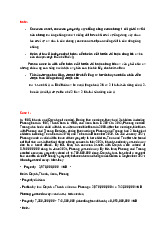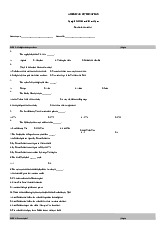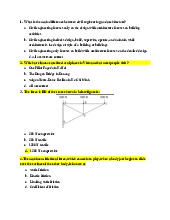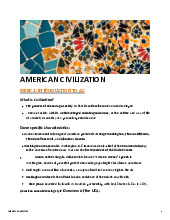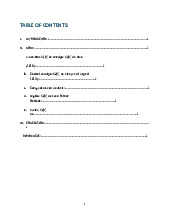





Preview text:
lOMoAR cPSD| 45903860 1 TABLE OF CONTENTS
CHAPTER I. INTRODUCTION
CHAPTER II. AMERICAN IDENTITY IN MUSIC: COUNTRY AND JAZZ 1. Country a) Origin b) Cultural significance c) Highlighted lyrics
d) Values for learners of American Civilization 2. Jazz a) Origin b) Cultural significance c) Highlighted lyrics
d) Values for learners of American Civilization
CHAPTER III: CONCLUSION References
CHAPTER I: Introduction
Music is a powerful medium that can capture the essence of a country's character
and reflect its cultural identity. In the context of American civilization, music has played a
crucial role in shaping and expressing the American identity. This report explores two
iconic genres of American music: country and jazz. By analyzing the origins, cultural
significance, highlighted lyrics, and values conveyed by these genres, learners of American
civilization can gain deeper insights into the diverse and rich tapestry of American identity.
CHAPTER II: American identity in music: Country and Jazz 1. Country a) Origin:
According to Bauer (2024), country music originated in the rural areas of the South and
West of the United States in the early 20th century. It evolved from the ballads, folk songs, lOMoAR cPSD| 45903860 2
and popular songs of English, Scots, and Irish settlers in the Appalachians and other
Southern regions. In Bauer’s words, the genre began to be commercially recorded in the
early 1920s, with Fiddlin’ John Carson achieving the first hit record in 1923. Later, in 1949,
the recording industry adopted the term "country and western music" to replace the
derogatory label "hillbilly music."
b) Cultural Significance
Country music holds significant cultural importance, fostering a sense of community and
preserving cultural heritage. To commence, country music holds a profound significance
in its ability to tell stories and establish emotional connections with listeners. Through its
narrative tradition, the genre showcases a remarkable talent for reflecting the personal and
communal experiences of its audience (Tolouei, 2023). The songs within this genre narrate
captivating tales of love, loss, hardship, and triumph, engendering a profound emotional
bond with those who listen. Furthermore, Tolouei claims that the heartfelt lyrics and
relatable stories found in country music evoke a strong sense of empathy and connection,
allowing listeners to feel deeply understood and represented.
Additionally, patriotism and American values are prominent themes in country music, as it
celebrates American identity through various means, as stated by Bauer (2024). Many
country songs specifically highlight themes of national pride, showcasing the beauty of the
nation and paying tribute to military sacrifices. Moreover, these songs serve as a cultural
reflection, reinforcing the values and traditions held by many Americans. In doing so, they
foster a strong sense of unity and pride among listeners, connecting them through a shared
appreciation for their cultural heritage.
Ultimately, Bauer believes that country music plays a crucial role in both fostering a sense
of community and preserving cultural heritage. The genre creates a deep sense of belonging
among its listeners, resonating with them through shared cultural and emotional
experiences. Likewise, country music actively works towards the preservation of traditions,
particularly those rooted in the Southern United States. By celebrating the region's musical
traditions and historical narratives, country music helps maintain a strong cultural identity
and ensures continuity through the power of music.
c) Highlighted lyrics
Different aspects of the American experience are captured in the lyrics of country music. Here are some examples:
"If tomorrow all the things were gone
I worked for all my life
And I had to start again
With just my children and my wife I thank my lucky stars
To be living here today
'Cause the flag still stands for freedom lOMoAR cPSD| 45903860 3
And they can't take that away"
"God Bless the USA" by Lee Greenwood
In Lee Greenwood's "God Bless the USA," the lyrics depict unwavering pride in being
American, even in the face of adversity (GGI Insights, 2024). The singer's imagination of
losing everything highlights the belief in the American Dream, where hard work and
determination provide opportunities for rebuilding. The mention of the American flag
symbolizes the nation's values and invokes a sense of national pride and appreciation for
the freedoms enjoyed by Americans. The lyrics exhibit patriotism and gratitude for living
in a country that values liberty and democracy.
On the other hand, Loretta Lynn's "Coal Miner's Daughter" sheds light on the economic
struggles faced by many American families, particularly those in blue-collar jobs.
"Well, I was borned a coal miner's daughter
In a cabin, on a hill in Butcher Holler
We were poor but we had love
That's the one thing that daddy made sure of
He shoveled coal to make a poor man's dollar"
"Coal Miner's Daughter" by Loretta Lynn
The lyrics portray the resilience and hardships of working-class American families,
specifically reflecting the lives of those in regions like Appalachia. Despite financial
hardship, there is an emphasis on the importance of love and familial bonds, which are
fundamental components of American values. The song captures the experiences of many
Americans who have lived under similar circumstances, culturally reflecting their lives and the challenges they face.
d) Values for learners of American Civilization
Country music often touches upon patriotism and the values that define America (GGI
Insights, 2024). Songs that celebrate the beauty of the nation and honor the sacrifices of
the military strike a chord with many Americans, fostering a sense of unity and pride.
Additionally, country music reflects on the struggles and triumphs of everyday life, further
resonating with listeners. Through these songs, learners of American Civilization can gain
a deeper understanding of the core values that shape American identity. The songs illustrate
the importance of patriotism, resilience, family, and the pursuit of the American Dream.
They provide a rich cultural context that highlights the unique spirit and character of the United States. 2. Jazz a) Origin:
In Masterclass (2020)’s words, jazz is a music genre that originated in the AfricanAmerican
communities of New Orleans, Louisiana, in the late 19th and early 20th centuries, with its
roots in blues, ragtime, European harmony and African rhythmic rituals. lOMoAR cPSD| 45903860 4
b) Cultural significance
According to Carney & Patterson (2003), jazz music holds immense cultural significance
due to its expression of freedom and innovation. The improvisational nature of jazz enables
musicians to break away from structured and conventional forms of music, allowing them
to convey their unique artistic visions.
Moreover, jazz played a crucial role in promoting social integration and racial harmony in
America (Forbes, n.d.). Particularly during the Swing Era, jazz became one of the first
genres where black and white musicians performed together. This collaborative effort
challenged the prevailing norms of segregation and played a part in breaking down racial
barriers, contributing to the larger Civil Rights Movement.
On top of that, jazz serves as a celebration of African American culture, showcasing its
resilience and creativity (Forbes, n.d.). Rooted in the rich musical traditions of African
American communities, jazz incorporates elements of African rhythms, blues, and
spirituals. The genre pays homage to the cultural heritage of African Americans, allowing
them to express their unique experiences and artistic expressions. Jazz stands as a testament
to the cultural identity and pride of the African American community, showcasing their
contributions to the world of music.
c) Highlighted lyrics
Jazz music's lyrics portray several facets of the American experience. Listed below are a few examples:
“Summertime and the livin' is easy
Fish are jumpin' and the cotton is high
Oh, your daddy's rich and your ma is good lookin'
So hush, little baby, don't you cry”
“Summertime” – Ella Fitzgerald & Louis Armstrong (1935)
According to Fripp (2024), "Summertime" is a song that captures the essence of summer,
describing the simple pleasures and beauty of the season. The lyrics also explore themes
of growing up, curiosity, and the unknown future, such as cotton ready for harvest and fish
swimming in warm water. It is also deeply rooted in the African-American experience,
reflecting both the struggles and resilience of the community. The lyrics highlight the desire
for a better life and the enduring hope for a brighter future.
On the other hand, “Strange Fruit” by Billy Holiday song challenges the prevailing cultural
norms of social integration and racial harmony.
"Southern trees bear a strange fruit,
Blood on the leaves and blood at the root,
Black bodies swinging in the Southern breeze,
Strange fruit hanging from the poplar trees."
“Strange Fruit” – Billy Holiday (1939) lOMoAR cPSD| 45903860 5
Through its haunting depiction of racial violence and lynching, the song exposes the deep-
rooted injustice faced by African Americans in the United States (Nichols, 2001). By
addressing this taboo subject matter, Billie Holiday amplifies the African American
experience and urges listeners to confront the harsh realities of systemic racism. "Strange
Fruit" serves as a powerful protest against racial oppression and a call for social change.
d) Values for learners of American Civilization
In Nichols (2001)’s view, jazz music has brought great values of creativity and resilience
to American Civilization learners, especially during the time of the Civil War, as it
showcases the creativity and resilience of Black Americans during a time of oppression
and segregation, while also reflecting social and cultural changes following the Civil War,
such as urbanization and the Great Migration. Additionally, Nichols claims that jazz
musicians often used their music to express social and political commentary, providing
valuable insights into the experiences of African Americans during Reconstruction and beyond.
CHAPTER III: CONCLUSION
In conclusion, country music and jazz represent the American identity in distinct ways.
Country music, tells stories and celebrates American values, fostering unity and pride. Jazz,
on the other hand, signifies freedom, innovation, and social integration, challenging racial
barriers. Both genres provide valuable insights into American history and culture. Music
serves as a powerful medium for understanding the diverse facets of the American identity throughout history. Reference
1. Bauer, P. (2024). Country music | Definition, artists, history, & facts. Encyclopedia Britannica.
2. GGI Insights, (2024) Country music: Telling America’s stories, Gray Group International.
3. “Coal Miner’s Daughter”. Country Music Project. (n.d.).
4. MasterClass. (2020). “What is jazz? A guide to the history and sound of jazz.” Aubrey Neil Leveridge
5. Forbes, Y. (n.d.). Why It Matters: The Jazz Age | United States History II.
Courses.lumenlearning.com.
6. Carney, C. (2003). Jazz and the cultural transformation of America in the 1920s. LSU
Doctoral Dissertations, 176.
7. Bennion, R. (2016, November 14). Jazz Music and the Civil Rights Movement. Gold Standard.
8. Fripp, M. (2024). The best jazz songs of all time [Expanded edition]. Jazzfuel. lOMoAR cPSD| 45903860 6
9. Top 10 Influential Jazz Songs. (n.d.). The Blackwhite. 10.
Nichols, S. (2001). Ken Burns’ JAZZ: from Civil War to civil war. Australian Financial Review. Thank You
